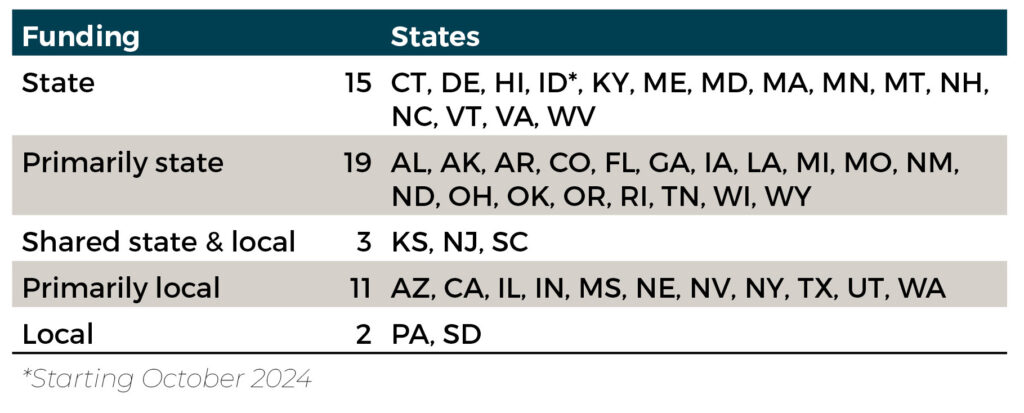Pennsylvania is off the “no state funding” list. Is South Dakota next?

Pleading the Sixth. At the start of 2023, Pennsylvania and South Dakota were the last two states remaining to contribute no funding to indigent defense. This morning, Pennsylvania is no longer on that list. And just last week, the South Dakota Governor publicly supported increasing the state’s role in indigent defense in response to a state supreme court task force. This means that America may finally be able to do away with its “no state funding” list in 2024.
The U.S. Supreme Court determined that ensuring the Sixth Amendment right to counsel is a state – not local – government obligation. State government funding is called for by the American Bar Association’s Ten Principles because local jurisdictions most in need of indigent defense services are often the ones least able to afford them. At the start of 2023, Pennsylvania and South Dakota were the only two states to contribute no funding to indigent defense.

BREAKING NEWS: Pennsylvania passes first-ever state indigent defense funding
Pennsylvania has long been on notice for failing to ensure effective representation:
- A 1995 ABA-sponsored report concluded that Allegheny County (Pittsburgh) prevented the public defender’s office from providing constitutionally adequate representation through underfunding and neglect. A 2011 ACLU report concluded Allegheny County achieved no improvements in the intervening 16 years.
- A 2002 NLADA report found that Venango County’s public defender office was understaffed and underfunded.
- A 2003 Pennsylvania Supreme Court Committee on Racial and Gender Bias in the Justice System report found serious indigent defense deficiencies, including a prevalence of flat fee contracts creating disincentives to effective advocacy.
- A 2003 Juvenile Law Center report found serious deficiencies in the delivery of indigent defense to juvenile defendants statewide.
- A 2011 Joint State Government Task Force on Services to Indigent Criminal Defendants report found that the problems identified in the 2003 Supreme Court Committee remained.
- A 2021 Legislative Budget and Finance Committee report found that Pennsylvania public defender offices lacked caseload controls.
Earlier in the year, Governor Shapiro included $10 million for indigent defense in the annual budget (subsequently decreased to $7.5 million). However, this new funding could not be used without the state legislature passing a fiscal code allowing for it. On December 13, the final day of the 2023 session, the legislature passed the fiscal code creating an indigent defense advisory group within the existing Pennsylvania Commission on Crime and Delinquency. The indigent defense advisory group is tasked with proposing minimum statewide standards on qualifications and data collection, providing training, and awarding grants.
Meanwhile…
South Dakota Governor publicly supports state funding
In February 2023, after the South Dakota Supreme Court Chief Justice called for the legislature to study indigent defense, South Dakota Governor Noem signed HB 1064 creating an indigent defense task force. The Indigent Defense Task Force produced a final report in September 2023 recommending the creation of an independent, nine-member statewide indigent commission to oversee a state public defender office. In the initial phase, the state public defender would consist of full-time attorneys to provide direct appellate representation and train trial-level attorneys at an estimated cost of $1.4 million. Decisions on further trial-level representation was deferred in favor of a 6AC evaluation (anticipated report publication: Fall 2024).
The task force recommendations got a strong boost last week when the Governor delivered her budget address:
“A strong criminal justice system supports our American way of life. It upholds the rights of our people. That includes the Sixth Amendment right to legal counsel. South Dakota has not guaranteed this right in a coordinated way in the past. This makes it difficult for courts to obtain qualified and willing attorneys to fill this critical defender role. … I am recommending that South Dakota create a statewide indigent defense commission that will oversee a statewide appellate defender office…. This office would also provide training and mentorship to rural attorneys.”
It must always come back to standards
We do not want to give the impression that a state providing some funding solves all there is to an indigent defense crisis. The answer is not in state dollars, but rather, in state commitment to ensure minimum standards of effective representation to every indigent defendant (generally recognized to be the ABA Ten Principles) and then to adequately fund the system to meet those standards. Only then can a state meet its constitutional mandate.


